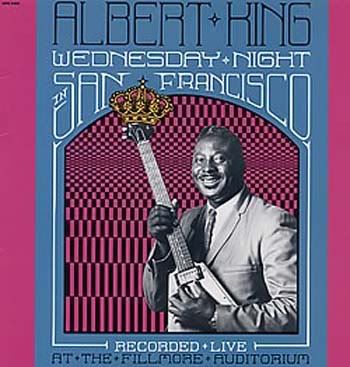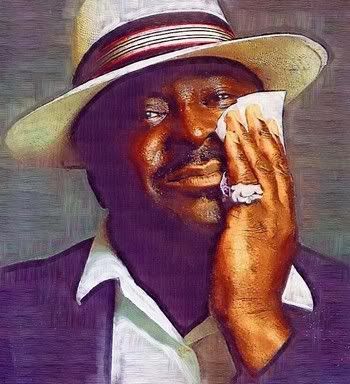
Albert King - Wednesday Night in San Francisco - 1990 - Stax
The late, great bluesman, Albert King is on top form throughout this album. which was recorded live at the Fillmore Auditorium on June 26, 1968. His solos are piercing and intense. The band is great, but King steals the show. His funky,earthy version of Herbie Hancock's classic "Watermelon Man" is a great example of the great man's guitar technique. In fact, the whole album is a display of some of King's best fretwork. The tracks are taken from the same dates as his "Live Wire/Blues Power" album, and the album contains some outtakes from those dates. There is another album from Albert King, "Thursday Night In San Francisco" which also contains tracks from the same "Live Wire/Blues Power" period. Outtakes or not, the tracks are all brilliant. It's a knockout album from one of the blues' most influential and appealing figures. Two of his many albums worth hearing include "Blues at Sunrise", and "I'm in a Phone Booth, Baby", and if you've never heard the 1999 Stax akbum "Albert King With Stevie Ray Vaughan - In Session", don't get too close, because it smokes, and could explode at any time! Lethal blues from the two masters.
Side One: TRACKS / COMPOSERS
1. Watermelon Man - (Herbie Hancock) – 4:04
2. Why You So Mean To Me - (King) – 7:55
3. I Get Evil - (King) – 5:25
4. Got To Be Some Changes Made - (King) – 9:24
Side Two:TRACKS / COMPOSERS
1. Personal Manager - (King/Porter) – 7:21
2. Born Under A Bad Sign - (Bell/Jones) – 4:08
3. Don't Throw Your Love On Me So Strong - (King) – 8:24
N.B: This album was also reissued on CD with a bonus Multimedia-Track, including video, biography, and pictures.
MUSICIANS
Albert King – Electric guitar and vocals
Willie James Exon – Guitar
James Washington – Organ
Roosevelt Pointer – Bass
Theotis Morgan – drums
BIOGRAPHY [Albert King (born Albert Nelson). April 25th, 1923 - December 21st, 1992. Birthplace: Indianola, Mississippi.]
Bluesman Albert King was one of the premier electric guitar stylists of the post-World War II period. By playing left-handed and holding his guitar upside-down (with the strings set for a right-handed player), and by concentrating on tone and intensity more than flash, King fashioned over his long career, a sound that was both distinctive and highly influential. He was a master of the single-string solo and could bend strings to produce a particularly tormented blues sound that set his style apart from his contemporaries. A number of prominent artists,from Eric Clapton and Jimi Hendrix to Mike Bloomfield and Stevie Ray Vaughan, borrowed heavily from King's guitar style. King was also the first major blues guitarist to cross over into modem soul;his mid- and late 1960s recordings for the Stax label, cut with the same great session musicians who played on the recordings of Otis Redding, Sam & Dave,Eddie Floyd, and others, appealed to his established black audience while broadening his appeal with rock fans. Along with B.B. King (no relation, though at times Albert suggested otherwise) and Muddy Waters, King helped nurture a white interest in blues when the music needed it most to survive. King was born in Mississippi and taught himself how to play on a homemade guitar. Inspired by Blind Lemon Jefferson, King quit singing in a family gospel group and took up the blues. He worked around Osceola, Arkansas, with a group called the In the Groove Boys before migrating north and ending up in Gary,Indiana, in the early 1950s. For a while, King played drums behind bluesman Jimmy Reed. In 1953, King convinced Parrot label owner Al Benson to record him as a blues singer and guitarist. That year King cut "Bad Luck Blues" and "Be On Your Merry Way" for Parrot. Because King received little in the way of financial remuneration for the record, he left Parrot and eventually moved to St. Louis, where he recorded for the Bobbin and the King labels. In 1959 he had a minor hit on Bobbin with "I'm a Lonely Man." King's biggest release, "Don't Throw Your Love on Me So Strong," made it to number 14 on the R&B charts in 1961. King didn't become a major blues figure until after he signed with Stax Records in 1966. Working with producer-drummer Al Jackson, Jr., guitarist Steve Cropper, keyboards ace Booker T. Jones, and bass player Donald "Duck"Dunn-aka Booker T. and the MG's, King created a blues sound that was laced with Memphis soul strains. Although the blues were dominant on songs such as"Laundromat Blues" and the classic "Born Under A Bad Sign", the tunes had Memphis soul underpinnings that gave King his crossover appeal. Not only was he the first blues artist to play the legendary San Francisco rock venue the Fillmore West, but he was also on the debut bill, sharing the stage opening night in1968 with Jimi Hendrix and John Mayall. King went on to become a regular at the Fillmore; his album Live Wire/Blues Power was recorded there in 1968.King was also one of the first bluesman to record with a symphony orchestra: in1969 he performed with the St. Louis Symphony, triumphantly bringing together the blues and classical music, if only for a fleeting moment. During the 1970s King toured extensively, often playing to rock and soul crowds. He left Stax in 1974 to record for independent labels like Tomato and Fantasy. King was inducted into the Blues Foundation's Hall of Fame in 1983.He continued touring throughout the 1980s and early 1990s, playing festivals and concerts, often with B.B. King. He died of a heart attack in 1992, just prior to starting a major European tour. [taken from http://staxrecords.free.fr/index.htm]

BIO (Wikipedia)
One of the "Three Kings of the Blues Guitar" (along with B.B. King and Freddie King), he stood at least 6' 4" (192 cm), weighed in at least 260 lbs (118 kg) and was known as "The Velvet Bulldozer". He was born Albert Nelson on a cotton plantation in Indianola, Mississippi. During his childhood he would sing at a family gospel group at a church. He began his professional work as a musician with a group called In The Groove Boys, in Osceola, Arkansas. He also briefly played drums for Jimmy Reed's band and on several early Reed recordings. Influenced by Blues musicians Blind Lemon Jefferson and Lonnie Johnson, but also interestingly Hawaiian music, the electric guitar became his signature instrument, his preference being the Gibson Flying V, which he named "Lucy". King was a left-handed "upside-down/backwards" guitarist. He was left-handed, but usually played right-handed guitars flipped over upside-down so the low E string was on the bottom. In later years he played a custom-made guitar that was basically left-handed, but had the strings reversed (as he was used to playing). He also used very unorthodox tunings (i.e., tuning as low as C to allow him to make sweeping string bends). A "less is more" type blues player, he was known for his expressive "bending" of notes, a technique characteristic of blues guitarists. His first minor hit came in 1958 with "I'm a Lonely Man" written by Bobbin Records A&R man and fellow guitar hero Little Milton, responsible for King's signing with the label. However, it was not until his 1961 release "Don't Throw Your Love on Me So Strong" that he had a major hit, reaching number fourteen on the R&B charts. In 1966 he signed with the famous Stax record label. Produced by powerhouse drummer Al Jackson, Jr., King with Booker T. & the MGs recorded dozens of hugely influential sides, such as "Crosscut Saw" and "As The Years Go Passing By", and in 1967 Stax released the legendary album, Born Under a Bad Sign. The title track of that album (written by Booker T. Jones and William Bell) became King's most well known song and has been covered by many artists (from Cream to Homer Simpson) Another landmark album followed in Live Wire/Blues Power from one of many seminal dates King played at promoter Bill Graham's Fillmore venues. In the 1970s, King was teamed with members of The Bar-Kays and The Movement (Isaac Hayes's backing group), including bassist James Alexander and drummer Willie Hall adding strong Funk elements to his music. Adding strings and multiple rhythm guitarists, producers Allen Jones and Henry Bush created a wall of sound that contrasted the sparse, punchy records King made with Booker T. & the MGs. Among these was another signature tune for King with "I'll Play the Blues For You" in 1972. King influenced many later blues guitarists including Eric Clapton, Jimi Hendrix, Mick Taylor, Warren Haynes, Mike Bloomfield, Gary Moore, Joe Walsh (The Eagles guitarist spoke at King's funeral), and especially Stevie Ray Vaughan, who also covered many of King's songs. He also had a profound impact on contemporaries Albert Collins and Otis Rush. Clapton has said that his work on the 1967 Cream hit "Strange Brew" and throughout the album Disraeli Gears was inspired by King. King died on December 21, 1992 from a heart attack in Memphis, Tennessee.





1 comment:
LINK
Post a Comment